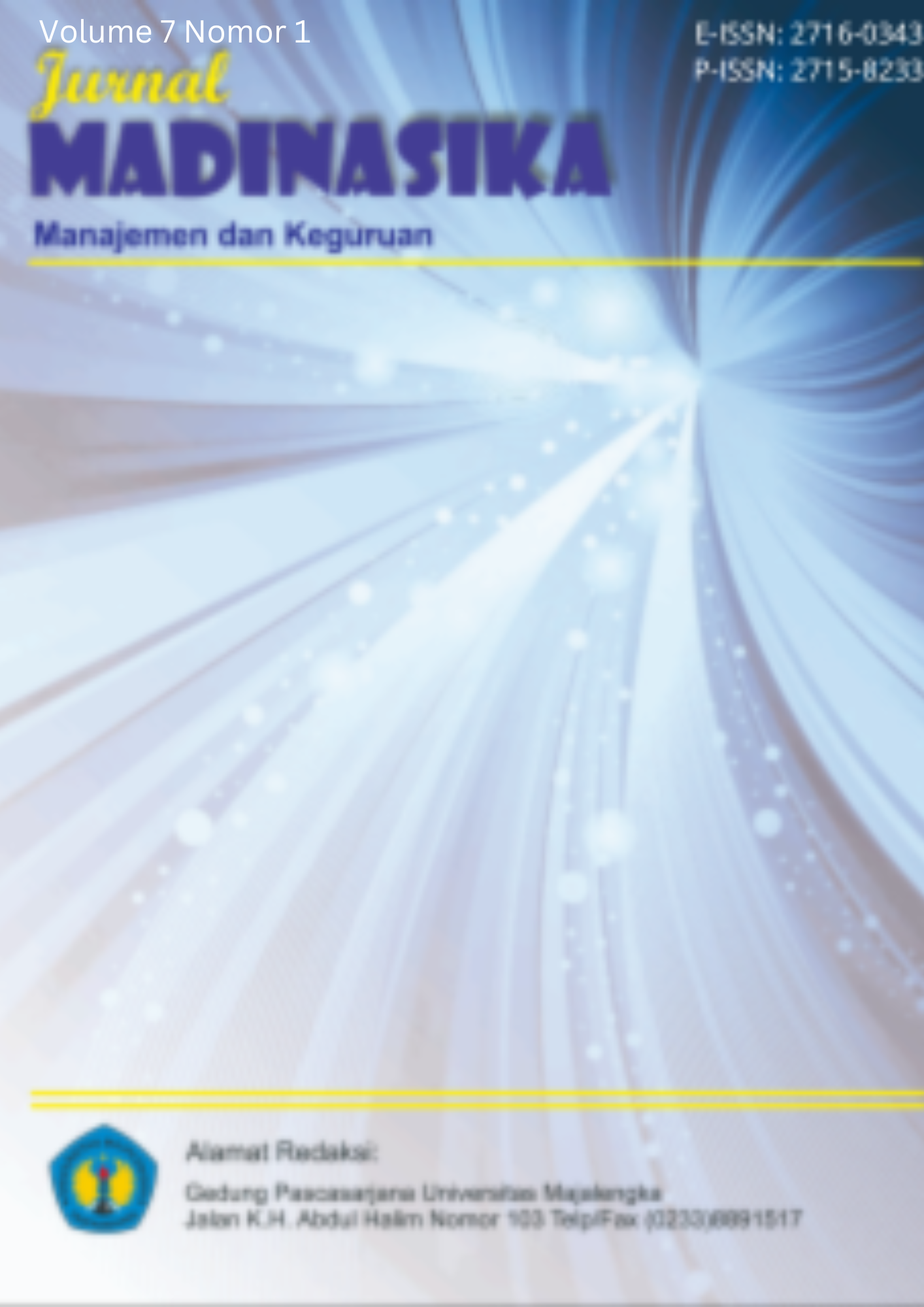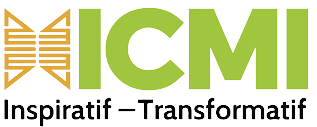APPRECIATIVE LEADERSHIP TRANSFORMATION: CULTIVATING POSITIVE CULTURE AND ENHANCING COLLECTIVE PERFORMANCE IN EDUCATIONAL SETTINGS
DOI:
https://doi.org/10.31949/madinasika.v7i1.15678Abstract
This study aims to explore the practice of appreciative leadership in school settings and its impact on the development of a positive culture and the enhancement of collective performance. Employing a qualitative approach with an intrinsic case study design, the research involved principals and teachers from primary and secondary education institutions in Jakarta, Indonesia, as research subjects. Data were collected through in-depth interviews, participatory observation, and document analysis, and were analysed using inductive thematic techniques. The findings revealed five key themes: (1) appreciation functions as a driver of a positive school culture; (2) reflective and empathic communication serves as the foundation of effective leadership; (3) teacher empowerment is carried out through trust and the delegation of strategic responsibilities; (4) appreciative social relations foster collective teacher efficacy; and (5) the alignment between leaders’ personal values and the school’s organizational culture strengthens leadership effectiveness. These findings reinforce previous literature on appreciative leadership, compassionate leadership, and emotional regulation in educational leadership. The study contributes to the development of a contextual, reflective, and well-being-oriented conceptual framework of appreciative leadership in education. Future research is encouraged to employ longitudinal and quantitative approaches to enhance the validity of findings and examine the broader impact of leadership on student learning outcomes.
Keywords:
appreciative leadership, positive school culture, collective performance, teacher efficacy, educational well-beingDownloads
References
Agazu, B. G., Kero, C. A., & Debela, K. L. (2025). Transformational leadership and firm performance: a systematic literature review. Journal of Innovation and Entrepreneurship, 14(1). https://doi.org/10.1186/s13731-025-00476-x
Al-Zu’bi, M. A. A., Al-Mseidin, K. I. M., Yaakob, M. F. M., Fauzee, M. S. O., Mahmood, M. H. H., Sohri, N., Al-Mawadieh, R. S. M., & Senathirajah, A. R. B. S. (2024). The impact of the school educational environment on primary school teachers’ commitment to educational quality. Discover Sustainability, 5(1). https://doi.org/10.1007/s43621-024-00633-4
Armstrong AJ, Holmes CM, & Henning D. (2020). A changing world, again. How Appreciative Inquiry can guide our growth. Soc Sci Humanit Open, 2(1):100038. Available from: https://doi.org/10.1016/j.ssaho.2020.100038
Chiriac, E. H., Forsberg, C., & Thornberg, R. (2023). Teacher teams: A safe place to work on creating and maintaining a positive school climate. Social Psychology of Education, 27(4), 1775–1795. https://doi.org/10.1007/s11218-023-09880-1
Choong, Y. O., & Ng, L. P. (2024). Shaping teachers’ organizational citizenship behavior through self-efficacy and trust in colleagues: moderating role of collective efficacy. BMC Psychology, 12(1), 532. https://doi.org/10.1186/s40359-024-02050-8
Czakert J.P & Berger R. (2024). The Influence of Leadership on Employees’ Work-nonwork Interface and Wellbeing: A Scoping Review. Curr Psychol, 43(7):6075–100. Available from: https://doi.org/10.1007/s12144-023-04762-3
Dai, R., Thomas, M. K. E., & Rawolle, S. (2024). The roles of AI and educational leaders in AI-assisted administrative decision-making: a proposed framework for symbiotic collaboration. Australian Educational Researcher, 52(2), 1471–1487. https://doi.org/10.1007/s13384-024-00771-8
Eyal, O., Berkovich, I., & Yosef-Hassidim, D. (2024). Principal-Teachers Agreement on Teachers’ Interpersonal Emotion Regulation: Relations with Principals’ Transformational Leadership, Teaching Staff Positive Collective Emotions, and Teaching Staff Organizational Commitment. Asia-Pacific Education Researcher. https://doi.org/10.1007/s40299-024-00938-y
Gomes, A. R. (2023). The Social Value of Leadership: a Contribution from the Leadership Efficacy Model. Trends in Psychology, 0123456789. https://doi.org/10.1007/s43076-023-00321-8
Granville-Chapman, K., Lee, M. T., & Ritchie-Dunham, J. (2024). The Development of a New Model of Educational Leadership: Leadership for Teacher Flourishing. Humanistic Management Journal, 9(2), 247–267. https://doi.org/10.1007/s41463-024-00181-z
Jambarsang S, Mehrparvar A.H., & Keshmiri F. (2025). Assessment of leadership and professional behavior of educational managers in the complex and post-crisis era: perspectives of educators. BMC Res Notes, 18(1):107. Available from: https://doi.org/10.1186/s13104-025-07166-7
Mincu M. (2022). Why is school leadership key to transforming education? Structural and cultural assumptions for quality education in diverse contexts. Prospects, 52(3–4):231–42. Available from: https://doi.org/10.1007/s11125-022-09625-6
Muss, C., Tüxen, D., & Fürstenau, B. (2025). Empathy in leadership: a systematic literature review on the effects of empathetic leaders in organizations. In Management Review Quarterly (Issue 0123456789). Springer International Publishing. https://doi.org/10.1007/s11301-024-00472-7
Okçu, V., Cemaloğlu, N., & Ay, İ. (2024). The Effect of School Principals’ Empowering Leadership Behaviors on Well-Being at Work: The Mediating Role of Organizational Ostracism. Asia-Pacific Education Researcher, 777–791. https://doi.org/10.1007/s40299-024-00895-6
Orr, T., & Cleveland-Innes, M. (2015). Appreciative leadership: Supporting education innovation. International Review of Research in Open and Distributed Learning, 16(4), 235–241. https://doi.org/10.19173/irrodl.v16i4.2467
Ramachandran S, Balasubramanian S, James WF, & Al Masaeid T. (2024). Whither compassionate leadership? A systematic review [Internet]. Vol. 74, Management Review Quarterly. Springer International Publishing, 1473–1557 p. Available from: https://doi.org/10.1007/s11301-023-00340-w
Schophuizen, M., Kelly, A., Utama, C., Specht, M., & Kalz, M. (2023). Enabling educational innovation through complexity leadership? Perspectives from four Dutch universities. Tertiary Education and Management, 29(4), 471–490. https://doi.org/10.1007/s11233-022-09105-8
Saleh, M. S. M., Abd-Elhamid, Z. N., Afit Aldhafeeri, N., Ghaleb Dailah, H., Alenezi, A., Zoromba, M., & Elsaid Elsabahy, H. (2024). Appreciative Leadership, Workplace Belongingness, and Affective Commitment of Nurses: The Mediating Role of Job Crafting. Journal of Nursing Management, 2024. https://doi.org/10.1155/2024/2311882
Soomro, M. A, Kumar, A., Rani Shaikh, H., & Waqas Maharvi, M. (2024). Ethical Leadership and Followers’ Performance: The Mediation of Relational Identification International Journal of Organizational Leadership. International Journal of Organizational Leadership, 13, 344–354 . https://doi.org/10.33844/ijol.2024.60415
Sposato M. (2025). Artificial intelligence in educational leadership: a comprehensive taxonomy and future directions. Int J Educ Technol High Educ, 22(1):1–18. Available from: https://doi.org/10.1186/s41239-025-00517-1
Thien, L. M., & Liu, P. (2024). Linear and nonlinear relationships between instructional leadership and teacher professional learning through teacher self-efficacy as a mediator: a partial least squares analysis. Humanities and Social Sciences Communications, 11(1), 1–13. https://doi.org/10.1057/s41599-023-02500-5
Wang, T., Deng, M., & Tian, G. (2025). Facilitating teachers’ inclusive education intentions: the roles of transformational leadership, school climate, and teacher efficacy. Humanities and Social Sciences Communications, 12(1), 1–9. https://doi.org/10.1057/s41599-025-04977-8
Whitacre, D. (2025). A program evaluation of the new choices workforce development program: An appreciative inquiry approach. Evaluation and Program Planning, 108(September 2024), 102507. https://doi.org/10.1016/j.evalprogplan.2024.102507
Zadok A, Benoliel P, & Schechter C. (2025). School middle leaders’ personality traits and collective teachers’ efficacy: the moderating role of resource support. Soc Psychol Educ, 28(1):1–21. https://link.springer.com/article/10.1007/s11218-024-09982-4
Zheng, X., Yin, H., & Liu, Y. (2019). The Relationship Between Distributed Leadership and Teacher Efficacy in China: The Mediation of Satisfaction and Trust. The Asia-Pacific Education Researcher, 28(6), 509–518. https://doi.org/10.1007/s40299-019-00451-7
Published
Issue
Section
License
Copyright (c) 2025 Muh. Takdir, Apit Dulyapit

This work is licensed under a Creative Commons Attribution-NonCommercial 4.0 International License.












